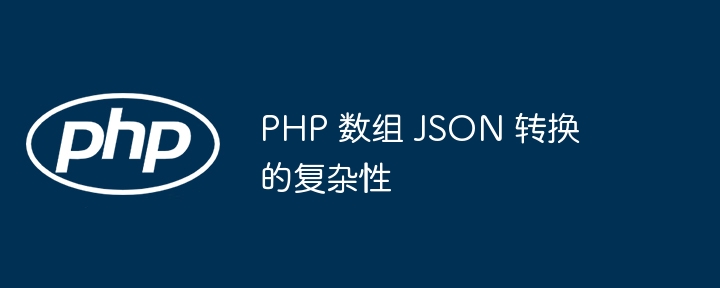
In PHP, conversion of complex arrays to JSON involves the following steps: Serialize complex arrays: Use the JSON_UNESCAPED_UNICODE option to handle Unicode characters. Deserialize complex JSON: Use the true option to convert JSON to an associative array, allowing access to properties of complex elements. Practical example: Demonstrates how to convert a PHP user information array to JSON and then convert it back into an array for use by the application.

Complex conversion between PHP arrays and JSON
In PHP development, it is often necessary to convert between arrays and JSON data structures Convert between. While simple conversions are relatively easy, the conversion process can become complicated when complex data structures are encountered.
Serializing Array
$complexArray = [
'name' => 'John Doe',
'age' => 30,
'address' => [
'street' => '123 Main Street',
'city' => 'Anytown',
'state' => 'CA',
'zip' => '12345'
],
'interests' => ['programming', 'music', 'reading']
];
$json = json_encode($complexArray);Deserializing JSON
$json = '{"name":"John Doe","age":30,"address":{"street":"123 Main Street","city":"Anytown","state":"CA","zip":"12345"},"interests":["programming","music","reading"]}';
$array = json_decode($json, true);Handling Complexity
The conversion process becomes more complicated when the array contains complex elements such as objects or resources (such as file handles).
Serializing complex arrays
class Person {
public $name;
public $age;
public function __construct($name, $age) {
$this->name = $name;
$this->age = $age;
}
}
$person = new Person('John Doe', 30);
$complexArray = [
'name' => $person,
'age' => 30,
// ...
];
$json = json_encode($complexArray, JSON_UNESCAPED_UNICODE);The JSON_UNESCAPED_UNICODE option is used to serialize Unicode characters to ensure they are not lost during deserialization.
Deserializing complex JSON
$json = '{"name":{"name":"John Doe","age":30},
"age":30,
// ...
}';
$person = json_decode($json, true)['name'];
// 访问属性
echo $person['name'];In order to deserialize JSON containing objects and other complex elements, we must use the true option. It will convert JSON to an associative array and allow us to access the properties of complex elements.
Practical Case
Suppose there is a PHP application that stores user information in an array. We need to convert this array to JSON for storage or transmission. Here is the sample code:
$userArray = [
'id' => 1,
'username' => 'johndoe',
'email' => 'johndoe@example.com',
// ...
];
$json = json_encode($userArray);
// 将 JSON 存储到数据库或发送给客户端We can then receive the JSON from the storage or client and convert it back into an array for consumption by the application:
$json = '{"id":1,"username":"johndoe","email":"johndoe@example.com"}';
$userArray = json_decode($json, true);
// 访问数组中的信息
echo $userArray['username'];By following the above guide and using With the appropriate options, we can efficiently handle conversions between complex PHP arrays and JSON, thus minimizing the risk of data corruption.
The above is the detailed content of Complexity of PHP array JSON conversion. For more information, please follow other related articles on the PHP Chinese website!